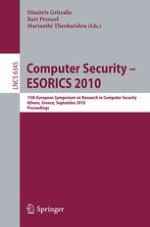2010 | OriginalPaper | Buchkapitel
Optimistic Fair Exchange with Multiple Arbiters
verfasst von : Alptekin Küpçü, Anna Lysyanskaya
Erschienen in: Computer Security – ESORICS 2010
Verlag: Springer Berlin Heidelberg
Aktivieren Sie unsere intelligente Suche, um passende Fachinhalte oder Patente zu finden.
Wählen Sie Textabschnitte aus um mit Künstlicher Intelligenz passenden Patente zu finden. powered by
Markieren Sie Textabschnitte, um KI-gestützt weitere passende Inhalte zu finden. powered by
Fair exchange is one of the most fundamental problems in secure distributed computation. Alice has something that Bob wants, and Bob has something that Alice wants. A fair exchange protocol would guarantee that, even if one of them maliciously deviates from the protocol, either both of them get the desired content, or neither of them do. It is known that no two-party protocol can guarantee fairness in general; therefore the presence of a trusted
arbiter
is necessary. In optimistic fair exchange, the arbiter only gets involved in case of faults, but needs to be trusted. To reduce the trust put in the arbiter, it is natural to consider employing multiple arbiters.
Expensive techniques like byzantine agreement or secure multi-party computation with Ω(
n
2
) communication can be applied to distribute arbiters in a non-autonomous way. Yet we are interested in efficient protocols that can be achieved by keeping the arbiters autonomous (non-communicating), especially for p2p settings in which the arbiters do not even know each other. Avoine and Vaudenay [6] employ multiple autonomous arbiters in their optimistic fair exchange protocol which uses global timeout mechanisms; all arbiters have access to -loosely- synchronized clocks. They left two open questions regarding the use of distributed autonomous arbiters: (1) Can an optimistic fair exchange protocol without timeouts provide fairness (since it is hard to achieve synchronization in a p2p setting) when employing multiple autonomous arbiters? (2) Can any other optimistic fair exchange protocol with timeouts achieve better bounds on the number of honest arbiters required? In this paper, we answer both questions negatively. To answer these questions, we define a general class of optimistic fair exchange protocols with multiple arbiters, called “distributed arbiter fair exchange” (DAFE) protocols. Informally, in a DAFE protocol, if a participant fails to send a correctly formed message, the other party must contact some subset of the arbiters and get correctly formed responses from them. The arbiters do not communicate with each other, but only to Alice and Bob. We prove that no DAFE protocol can meaningfully exist.
